Middle class myths
Pakistani nationalism is tinged by Islam and anti-Indian passions. Nationalism is a middle-class exceptionalism.

Middle class myths
Nasr says the Muslim middle class will be a force that will be in favour of openness, and trade, and commerce with the rest of the world and within the Middle East itself. “Some of this is true in Pakistan where economic growth has been very limited, but also where a new middle class seems to have emerged, energised and given a voice by the rapid expansion of electronic media, making the ordinary Pakistani far more aware of the world than before”.
Stephen P Cohen in his book The future of Pakistan (The Brookings Institution Washington DC, 2011) disagrees because he thinks that the Euro-centric slogan of “no bourgeoisie, no democracy” will not apply to Muslims. He sees no inherent connection between an urban middle class and pressure for democracy. Rarely unified or motivated by collective social interests, the middle classes across Asia and Latin America have shown themselves to be quite capable of backing illegitimate, autocratic governments for their narrow economic and material interests.
The Pakistani middle classes, he says, are no exception: “Moreover, any prospective material benefits of trade with India will not necessarily accrue to a particular class and could easily be counteracted by the anti-India psychosis that permeates popular media and the public education system where the middle class tends to be schooled”.
The Indian Constitution informs the attitude of the Indian middle class, which is tolerant of secularism. In Pakistan, the Constitution inclines the middle class to desire Sharia and consequently, prefer the ‘harder’ interpretation of al Qaeda over state ideology. It is the sentinel of the unchanging character of the medieval state presented as a utopia by state ideology, as interpreted by the clergy.
Many factors are common between the city-dwelling middle classes of India and Pakistan. The middle class lives in the city and votes rightwing. The Bhartiya Janata Party gets its vote in the city; the Congress party gets it from the rural areas. The PML-N gets its vote from the cities of Punjab; the PPP gets it from the rural areas of Punjab and Sindh. In Karachi, the middle class is conservative but its ‘secularism’ is strongly tinged with ethnicity, which means it is being unnaturally blocked from its internal dynamic by the leadership-in-exile of Altaf Hussain.
The middle class of Punjab disapproves of the middle class of Karachi and Hyderabad. Can we call the latter an ’unnatural’ middle class? If its conduct had not been dictated by an overarching force, wouldn’t it have persecuted the Ahmadis and other minorities or acquiesced in their persecution just like the middle class of Punjab as influenced by Pakistan’s Constitution? Or wouldn’t its lawyers — the vanguard of the middle class in the country — have celebrated the killers prowling the land under blasphemy law the same way as the lawyers of Punjab?
The Arab Spring has been betrayed by the Arab middle class. Olivier Roy wrote (Washington Post January 21, 2012): “Everywhere, the Muslim Brotherhood is benefiting from a democratisation it did not trigger. There is a political vacuum because the liberal vanguard that initiated the Arab Spring did not try, and did not want, to take power”.
The bazaar in Iran brought on the ayatollahs. Pakistani nationalism is tinged by Islam and anti-Indian passions. Nationalism is a middle-class exceptionalism.
Published in The Express Tribune, April 8th, 2012.















COMMENTS
Comments are moderated and generally will be posted if they are on-topic and not abusive.
For more information, please see our Comments FAQ